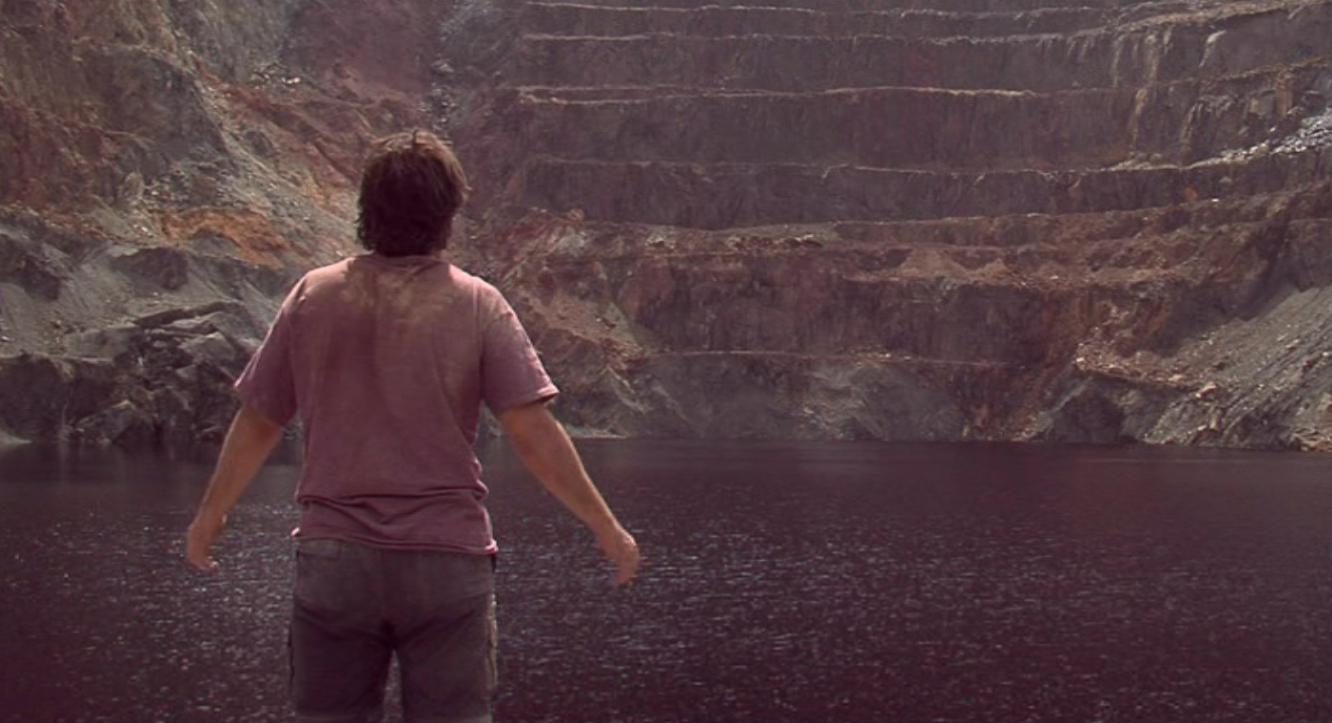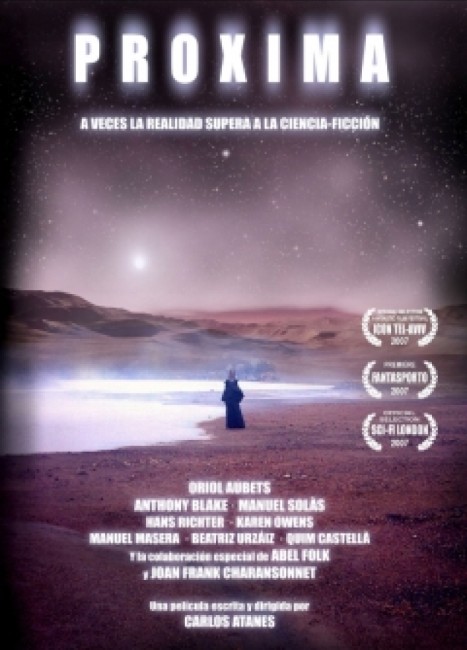Crew
Director/Screenplay – Carlos Atanes, Producer – Marta Timon, Photography – Joan Babiloni, Music – Xavier Tort, End Titles Theme – Manolo Tena, Visual Effects 3D Supervisor – Manu Martin, Art Direction – Antonio Lopez Alcantara & Angel F. Bueno. Production Company – Fortknox Audiovisual/Ciberpsique Audiovisual/Universidad de Nuelva/Asociacon de Atiguos Alumnos “3 de Marzo”.
Cast
Oriol Aubets (Tony), Joan Frank Charansonnet (Lucas), Hans Richter (Gabriel), Manuel Masera (Goknur), Abel Folk (Nestor), Anthony Blake (The Messenger), Manuel Solas (Felix Cadecq), Beatriz Urzaiz (Princess Io), Karen Owens (Natalia), Arantxa Peña (Susi), Quim Castella (Teo)
Plot
Tony is a science-fiction fan who feels under appreciated. His girlfriend Natalia complains about his constantly playing videogames, while he is forced to close the science-fiction specialty video/dvd store he runs from lack of customers. Tony and his best friend Lucas attend a science-fiction convention where the famous science-fiction writer Felix Cadecq is appearing as a guest. Cadecq gets up to announce that he has been in contact with the Tanlion Tetrarchy from Proxima Centauri and that he is quitting writing because science-fiction is taking over reality. The audience boo him and walk out. Tony picks up a copy of Felix’s cd. Listening to it later, he follows the instructions to blank his mind and is startled to find himself floating in space. When he returns, he finds that he has mysteriously recorded video messages that are all over the internet urging contact with the Tanlion Tetrarchy. He goes to join several other believers who are making plans for the arrival of the Tetrarchy and the nuclear war that will occur next year. Natalia then bursts in and has Tony abducted and taken to be deprogrammed from his delusions. Tony is able to use the Felix Cadecq cd to mentally transports himself into space where he is picked up by a spaceship and taken to a barren planet orbiting Proxima Centauri. He finds himself in the company of various other travellers who have been abandoned without any understanding of why they are there.
Proxima was the second feature-length film from Spanish director Carlos Atanes. Carlos Atanes had previously appeared with FAQ: Frequently Asked Questions (2004), a dystopian science-fiction film that sat just between a profusion of interesting imagery, a satirical sense of humour and having inhaled a little too much of the 1960s French Nouvelle Vague. Atanes would subsequently go onto make Codex Atanicus (2007), a collection of his short films, and two further science-fiction films Maximum Shame (2010) and Gallino the Chicken System (2012).
Proxima is certainly a quantum leap outwards from the things that Carlos Atanes was starting to explore in FAQ. It is difficult to sum up what Proxima is in a nutshell. Perhaps if one imagines something akin to a conceptual collision between Free Enterprise (1998) about the lives of science-fiction fans and the reality-bending works of author Philip K. Dick – Blade Runner (1982), Total Recall (1990), A Scanner Darkly (2006) etc. I was also reminded of the largely forgotten Nigel Kneale tv series Kinvig (1981) about a UFO fan who discovers that his neighbour may be an alien, but cannot be sure if he is not imagining it.
The first section of Proxima sets Oriol Aubets up as an all-too-familiar science-fiction fan who laments the world’s lack of understanding about his particular passion. Like Free Enterprise, this seems to be arcing towards the theme of the fan who is eventually forced by the pressures of the mundane world to give up adolescent dreams and accept adulthood’s responsibilities.
Like Free Enterprise, Carlos Atanes also peppers the film with references and in-jokes to his favourite science-fiction films and tv series. There are some cute bits – the final line of Blade Runner – “Too bad she won’t live. But then again who does?” – offered up as eulogy to the closing of the videostore, not before the requisite debate over it only being the last line depending on which version of the film one sees; a debate as to whether Star Wars (1977) correctly counts as science-fiction or fantasy; and a scene on the alien planet with Oriol Aubets and Manuel Masera communicating across the language barrier with the hummed themes to Star Wars and Star Trek: The Next Generation (1987-94). Atanes even flashes his knowledge of obscure films by name-dropping Segundo de Chomon – the early Spanish silent filmmaker, a contemporary of Georges Melies, who made a number of Melies-like ventures into the science-fiction, fantasy and special effects.
One of the most intriguing aspects of Proxima is the character of the celebrated science-fiction author who suddenly announces that he is giving up writing fiction because he has started contacting aliens. This has clearly been modelled on real-life author Philip K. Dick – note the homonymic similarity between the two names – Philip K. Dick/Felix Cadecq. In 1974, Dick had a strange hallucinatory experience where he believed that he was receiving visions about the universe from a possibly alien pink light that told him things before they happened. This caused Dick to give up writing for a time in an attempt to explain this baffling phenomenon. [For more detail, see discussion of the documentary The Gospel According to Philip K. Dick (2000)].

Aside from that, Proxima is a very Philip K. Dick-ian film with its abrupt conceptual twists and shifting revelations about what is real. After the various mundane establishing scenes at the store and convention, there is the wonderfully eerie scene where Oriol Aubets strips off in his blackened-out store and listens to the Felix Cadecq cd and then suddenly finds himself floating in space. Things become even stranger as he returns to the world and his best friend calls him to show him an internet video broadcast where he is now speaking in favour of communication with the aliens. The scenes joining the cult in the abandoned church come with Carlos Atanes’s dry sense of humour – like when Oriol Aubets is given a pressure suit to put on and protests that he is only being given is an empty cardboard box, only to be told that it is advanced technology. In the next of the reality-bending twists, Oriol Aubets is then abducted by girlfriend Karen Owens and handed over to cult deprogrammer Abel Folk who patiently explains how Aubets’ beliefs regarding the aliens are false ones that come from watching too much science-fiction.
In the next section, Oriol Aubets manages to escape imprisonment by inserting the Felix Cadecq cd and mentally transporting himself into space. In an extraordinarily lovely shot, we see Aubets walking on a digitally rendered moon and suddenly being picked up and taken aboard an alien ship made of rock that looks like a giant rotating potato dotted with tiny windows, which then takes off, gently rotating as it passes Jupiter and heads into the depths of space. It is during these scenes that Carlos Atanes suggests something of the journey through the stargate in 2001: A Space Odyssey (1968) and the scenes with the Discovery pod moving across eerily alien terrain. Atanes has also reunited with Xavier Tort, who was the lead actor and composed the score for FAQ, and Tort delivers a score that reminds strongly of the atonal choruses in 2001.
Oriol Aubets is then placed on an alien planet – in fact an open-cast mine in Andalucia, Spain. This has been effectively altered to become an alien world with pink rivers, coloured skies and more rock spaceships drifting overhead like giant inverted wedding cakes. It is in these scenes that Proxima is at its most thoughtful. I was reminded of Andrei Tarkovsky’s existential science-fiction in films like Solaris (1972) and Stalker (1979) with its image of a group of humans stranded on an alien planet and left drifting in a philosophical circle in the face of the vast and inexplicable.
The end section has Oriol Aubets being rescued by an exotic alien princess and carried away to the stars. It feels like a fanboy’s fantasy version of Close Encounters of the Third Kind (1977) and E.T. – The Extra-Terrestrial (1982) – where Steven Spielberg imagines a wondrous universe in which magical aliens will come to transport the child-like and pure of heart away with them, Carlos Atanes fantasizes a more teenage male one – where hot alien babes will come to confirm the lives of science-fiction fans who feel ignored and under-appreciated by the mundane world and tell them that their dreams and imagination can open the entire universe up. It is an ending that seems at once naively charming and a giant shaggy dog variant on Free Enterprise.
Trailer here


